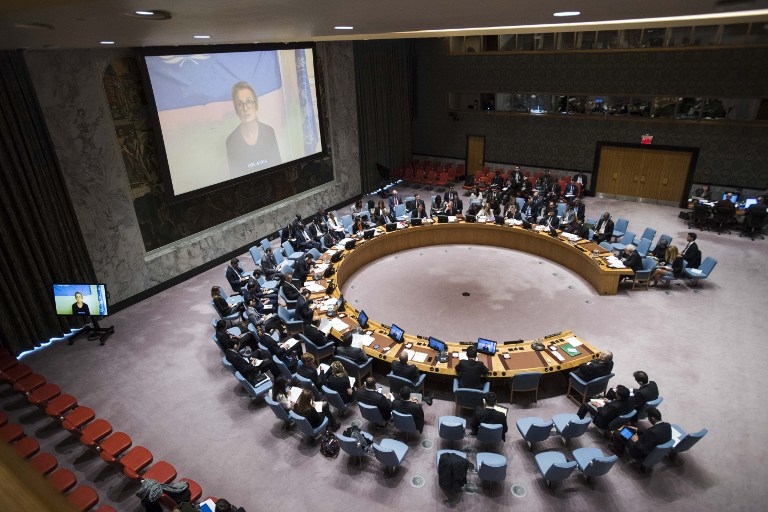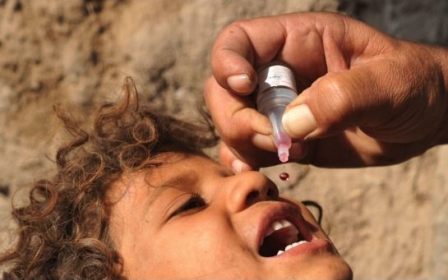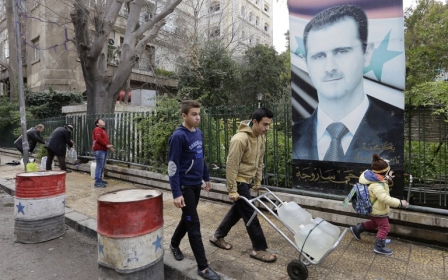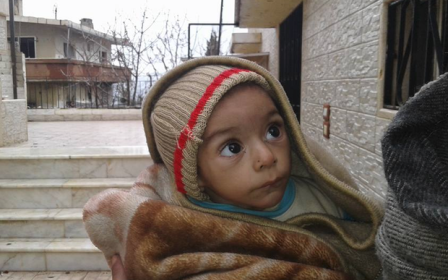WHO's response to Dr Annie Sparrow's article on its work in Syria

On 16 January, MEE published an essay by Dr Annie Sparrow, which criticises the World Health Organisation (WHO) for prioritising "warm relations with the Syrian government over meeting the most acute needs of the Syrian people".
Ahead of publication, we offered WHO a chance to respond to Sparrow's comments in her piece. A spokesman's answers follow below:
Middle East Eye: Sparrow argues that WHO is very aware that the Syrian government has used disease, including allowing the spread of polio, and deprivation as part of its war strategy, but that WHO is at pains not to acknowledge this publicly.
WHO: Regarding polio, WHO supports the Early Warning Alert and Response System to rapidly detect and respond to disease outbreaks across the country.
This is the same system which detected the spread of polio in 2013 and allowed for the swift elimination of the disease. Since that time, the disease surveillance system has been strengthened, and there are now more than 1600 sites across the entire country (1110 supported by WHO Syria and 535 from the hub in Gaziantep), including public health facilities, private physicians and NGO health services.
The access for inter-agency (IA) convoys to 18 besieged and 164 hard-to-reach and priority cross-line areas is facilitated by the office of Humanitarian Coordinator and OCHA.
From January-November 2016, WHO participated in 64 inter-agency convoys to besieged and hard-to-reach locations inside Syria, delivering 250 tons of medical and health supplies, including standard health kits, life-saving and life-sustaining medicines for treatment of chronic diseases, medical instruments and equipment.
Through 29 separate cross-line missions to hard-to-reach locations, WHO was able to provide an additional 35,000 treatments, mainly for chronic diseases (insulin, dialysis sessions, trauma kits).
In addition, WHO's 68 NGO partners continue to provide essential primary, secondary and trauma healthcare services, especially in hard-to-reach areas.
In its communication about Syria, WHO continually calls for unhindered access to besieged and hard-to-reach areas. Today, for example, a joint statement was issued by several UN agencies including WHO.
MEE: Sparrow argues that against the findings of WHO’s then-legal counsel, Gian Luca Burci, expressed in a 25 June 2013 email, WHO has been subsidising the Syrian Ministry of Defence by buying blood transfusion kits, screening tests for blood-borne diseases and hardware since 2014. Not only have these life-saving goods been put in the hands of a government that has a long history of ignoring humanitarian principles, but by supplying the goods, WHO has freed up defence ministry funds to be used to target hospitals, civilian infrastructure and incarcerate and torture doctors, acts which undermine WHO’s public-health priorities.
WHO: WHO does not work directly with the Ministry of Defence: WHO has distributed blood safety kits and blood bags to the National Blood Bank through the Ministry of Health and the Ministry of Higher Education.
All Syrian public, private and NGO hospitals are provided with blood bags from the National Blood Bank through its branches in the governorates. The National Blood Bank is the only entity in Syria that is fully and exclusively responsible for ensuring safe blood and blood products.
A report from an independent consultant from December 2016 noted “the existing challenges to be addressed in ensuring availability and safety of blood transfusion for the patients in need, both in government and opposition held areas, and recognising there were many gaps and weaknesses observed that need competent governance and leadership to address and improve these gaps and weaknesses. The assistance so far provided by WHO has been instrumental in ensuring the availability and safety of blood supply in the country."
The report also observed “the urgent need to continue the technical and in-kind support WHO has been providing to sustain and further develop the desired availability and safety of blood and clinical use in Damascus and the country in compliance with international standards and recommendations
The responsible directorates in the Ministry of Health and the Ministry of Higher Education prepare monthly distribution plans that set out the total number of blood bags required by healthcare facilities (including public and NGO-managed hospitals) for the coming month.
The National Blood Bank (through our partners; MOHE, MOH and NGOs) provides WHO with quarterly distribution data on the blood bags that were tested and distributed.
WHO initiates new orders for blood supplies on the basis of these data. WHO staff regularly visit healthcare facilities and interview staff and patients about the availability of blood transfusion services and the source of blood supplies. This information is triangulated against the data provided by the National Blood Bank.
When it comes to besieged areas, the need for safe blood is essential because these locations often see a high number of conflict-related injuries. WHO consistently demands that blood prepared by the National Blood Bank be sent to these areas, but unfortunately surgical supplies, including blood and blood products have been systematically rejected.
MEE: Sparrow questions whether WHO helped the Syrian government cover up the reason conjoined twin boys, born in Eastern Ghouta in July 2016, died the following month. She comes to this conclusion because she says WHO failed to correct the government’s publicly stated diagnosis (heart failure) which she says was clinically incompatible with their condition at the time, did not request a post-mortem or push for international evacuation and, instead, blamed the twins’ parents. She says it is likely that the twins died after a botched surgical separation.
WHO: In the case of the conjoined twins, WHO facilitated their evacuation and subsequently remained in close contact with the Syrian Arab Red Crescent, hospital staff and the children's family.
WHO operates in more than 40 countries dealing with humanitarian health emergencies ranging from disease outbreaks to conflicts to natural disasters. Its role in emergencies is to facilitate and support the health sector's effective, efficient and timely action to address public health priorities so that lives are saved and suffering is reduced. In this role, it is responsible for supporting ministries of health, coordinating the engagement of health partners in countries, collecting and analysing health information to inform decision making, and providing authoritative health guidance to national health authorities and health partners.
As a public health agency, it does not provide direct medical care to individuals.
This article is available in French on Middle East Eye French edition.
Middle East Eye propose une couverture et une analyse indépendantes et incomparables du Moyen-Orient, de l’Afrique du Nord et d’autres régions du monde. Pour en savoir plus sur la reprise de ce contenu et les frais qui s’appliquent, veuillez remplir ce formulaire [en anglais]. Pour en savoir plus sur MEE, cliquez ici [en anglais].




